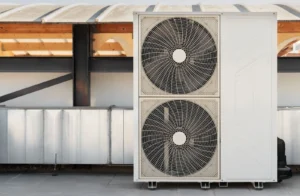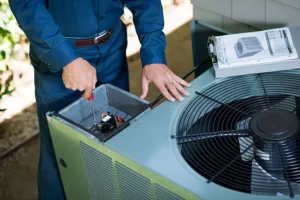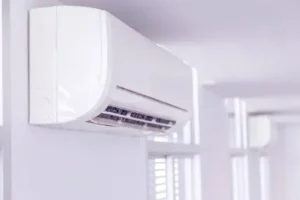Does your AC unit seem to be struggling lately? If so, that may be a classic case of low freon issues.
See, freon (also known as refrigerant) is a key part of any AC system. If this fluid is running low, your air conditioner won’t function at peak performance. In fact, attempting to use your system in these conditions could cause damage to it.
That said, freon isn’t something that gets used up. The only reason your AC unit would need more freon is if there’s a leak somewhere. If you suspect that’s the case, you may want to have an AC technician repair your unit.
Of course, you’ll first need to make sure your unit needs professional attention. Here are the 4 most common low freon symptoms you should be aware of.
1. Lukewarm Air
If your AC unit is leaking freon, it won’t be able to cool down the air it’s pumping out. Instead, it will only keep the air moving around.
As you can imagine, this will result in your air conditioner producing lukewarm air. If the problem is recent, you may experience a small temperature change. Still, your indoor temperature is unlikely to be comfortable.
Now, this won’t stop the system from trying to cool the air down. The thermostat will keep noting that the temperature isn’t where it should be, causing it to start new air cycles. This extra work is likely to shorten the unit’s lifespan.
2. High Energy Bills
It’s not hard to see why the issue we’ve outlined above can have a negative impact on your energy bills.
To keep your house at a set temperature, your AC unit will need to work harder. The more it runs, the more you’ll need to spend on cooling. This is particularly noticeable during the summer months.
Need some help to figure out whether your air conditioner needs freon? Take a look at your energy bills and compare them to the ones from last year. Unless you’re dealing with a huge heat wave, the amounts should be similar.
3. Hissing Noises
As we’ve mentioned, an AC unit that’s low on freon is likely leaking. Most of the time, this will result in hissing sounds.
Why does this happen? Well, the main reason is that the freon inside the refrigerant line is always pressurized. Since this line is a closed loop, a leak will result in freon getting pushed out at a high force, causing a hissing sound.
The bad news: this warning sign isn’t reliable. The hissing can appear from any part of the refrigerator line, and it’s always very quiet. You can try listening for it, but be careful — freon is dangerous if directly inhaled.
Addressing Low Freon Issues
Once you know you’re dealing with low levels of freon in the system, your best bet is to contact a professional.
Other than being hazardous to human health, freon can wreak havoc on your air conditioner. If it starts flowing back into the outside unit, it may damage the compressor. Needless to say, replacing those can get quite expensive.
Are you dealing with one or more of the above low freon symptoms? We may be able to help you out! Contact us right here, and our AC technicians will call you back soon.






